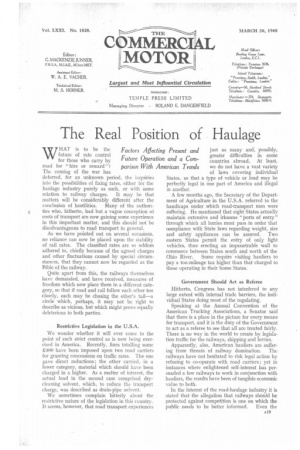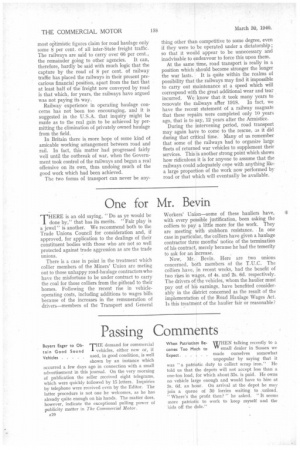The Real Position of Haulage
Page 21

Page 22

If you've noticed an error in this article please click here to report it so we can fix it.
WHAT is to be the future of rate control for those who carry by road for " hire or reward"? The coming of the war has deferred, for an unknown period, the inquiries into the possibilities of fixing rates, either for the haulage industry purely as such, or with some relation to railway charges. It may be that matters will be considerably different after the conclusion of hostilities. Many of the author', ties who, hitherto, had but a vague conception ot costs of transport are now gaining some experience in this important matter, and this should not be disadvantageous to road transport in general.
As we have pointed out on several occasions, no reliance can now be placed upon the stability of rail rates. The classified rates are so seldom adhered to, chiefly because of the agreed charges and other fluctuations caused by special circumstances, that they cannot now he regarded as the Bible of the railway.
Quite apart from this, the railways themselves have demanded, and have received, measures of freedom which now place them in a different category, so that if road and rail follow each other too closely, each may be chasing the other's tail—a circle which, perhaps, it may not be right to describe as vicious, but which might prove equally deleterious to both parties.
Restrictive Legislation in the U.S.A.
We wonder whether it will ever come to the point of such strict control as is now being exercised in America. Recently, fines totalling some £400 have been imposed upon two road carriers for granting concessions on traffic rates. The one gave direct reductions ; the other carried, in a lower category, material which should have been charged in a higher. As a matter of interest, the actual load in the second case comprised drycleaning solvent, which, to reduce the transport charge, was described as drain-pipe solvent_ We sometimes complain bitterly about the restrictive nature of the legislation in this country. It seems, however, that road transport experiences just as many and, possibly, greater difficulties in some countries abroad. At least, we do not have a vast variety of laws covering individual type of vehicle or load may be one part of America and illegal States, so that a perfectly legal in in another.
A few months ago, the Secretary of the Department of Agriculture in the U.S.A. referred to the handicaps under .which road-transport men were suffering. He mentioned that eight States actually maintain extensive and irksome "ports of entry" through which all lorries must pass in order that compliance with State laws regarding weight, size and safety appliances can be assured. Two eastern States permit the entry of only light vehicles, thus erecting an impenetrable wall to commerce between States south and north of the Ohio River. Some require visiting hauliers to pay a ton-mileage tax higher than that charged to those operating in their home States.
Government Should Act as Referee Hitherto, Congress has not interfered to any large extent with internal trade barriers, the individual States doing most of the regulating.
Speaking at the Annual Convention of the American Trucking Associations, a Senator said that there is a place in the picture for every means for transport, and it is the duty of the Government to act as a referee to see that all are treated fairly. There is no way in the world to create by legislation traffic for the railways, shipping and lorries.
Apparently, also, American hauliers are suffering from threats of railway domination. The railways have not hesitated to risk legal action by refusing to co-operate with road carriers ; yet in instances where enlightened self-interest has persuaded a few railways to work in conjunction with hauliers, the results have been of tangible economic value to both.
In the interest of the road-haulage industry it is stated that the allegation that railways should be protected against competition is one on which the public needs to be better informed. Even the most ojitimistic figures claim for road haulage only some 8 per cent. of all inter-State freight traffic. The railways are said to carry over 66 per cent., the remainder going to other agencies. It can, therefore, hardly be said with much logic that the capture by the road of 8 per cent. of railway traffic has placed the railways in their present precarious financial position, apart from the fact that at least half of the freight now conveyed by road is that which, for years, the railways have argued was not paying its way.
Railway experience in operating haulage concerns has not been too encouraging, and it is suggested in the U.S.A. that inquiry might be made as to the real gain to be achieved by permitting the elimination of privately owned haulage from the field.
In Britain there is more hope of some kind of amicable working arrangement between road and rail. In fact, this matter had progressed fairly well until the outbreak of war, when the Government took control of the railways and began a real offensive on its own, thus undoing much of the good work which had been achieved.
The two forms of transport can never be any thing other than competitive to some degree, even if they were to be operated under a dictatorship ; so that it would appear to be unnecessary and inadvisable to endeavour to force this upon them.
At the same time, road transport is really in a position which should become stronger the longer the war lasts. It is quite within the realms of possibility that the railways may find it impossible to carry out maintenance at a speed which will correspond with the great additional wear and tear incurred. We know that it took many years to renovate the railways after 1918. In fact, we have the recent statement of a railway magnate that these repairs were completed only 10 years ago, that is to say, 12 years after the Armistice.
During the intervening period, road transport may again have to come to the rescue, as it did during that critical time. Many of us remember that some of the railways had to organize large fleets of returned war vehicles to supplement their services. This is another strong point which shows how ridiculous it is for anyone to assume that the railways could adequately cope with anything like a large proportion of the work now performed by road or that which will eventually be available.




























































